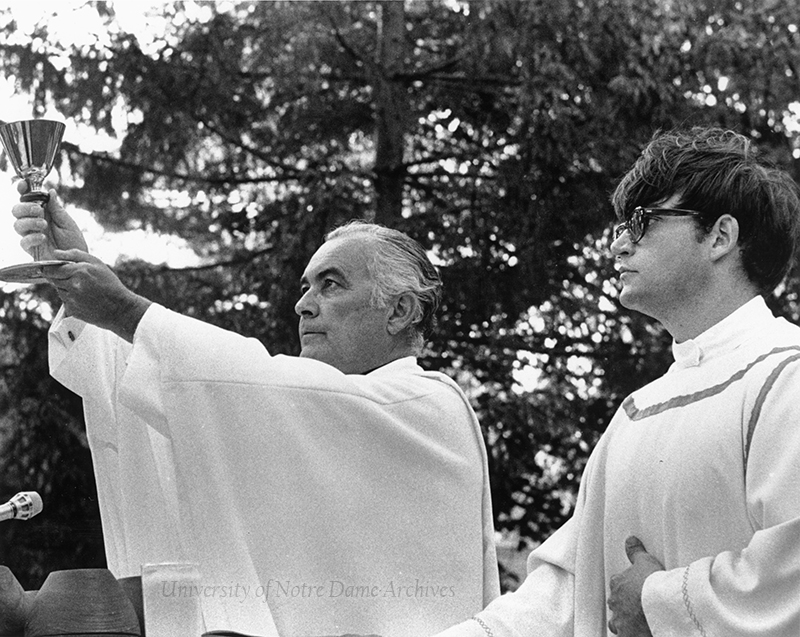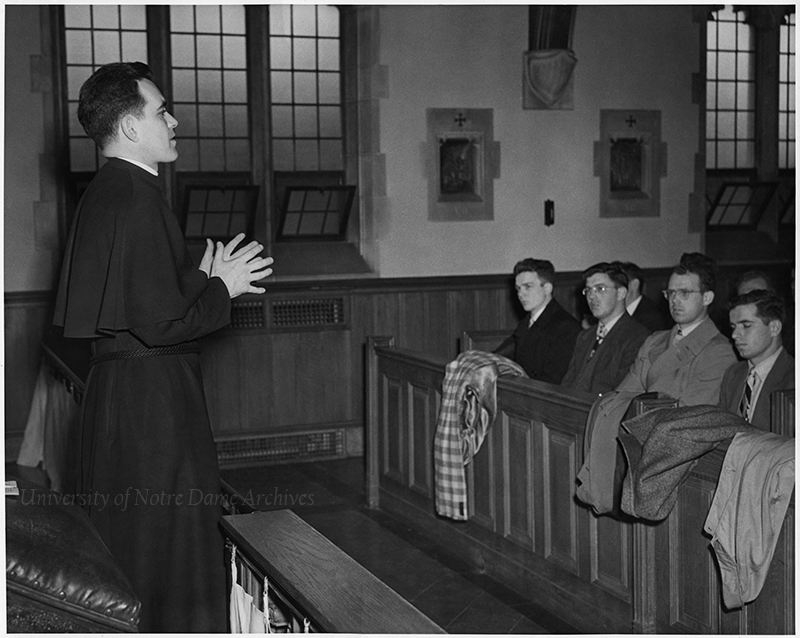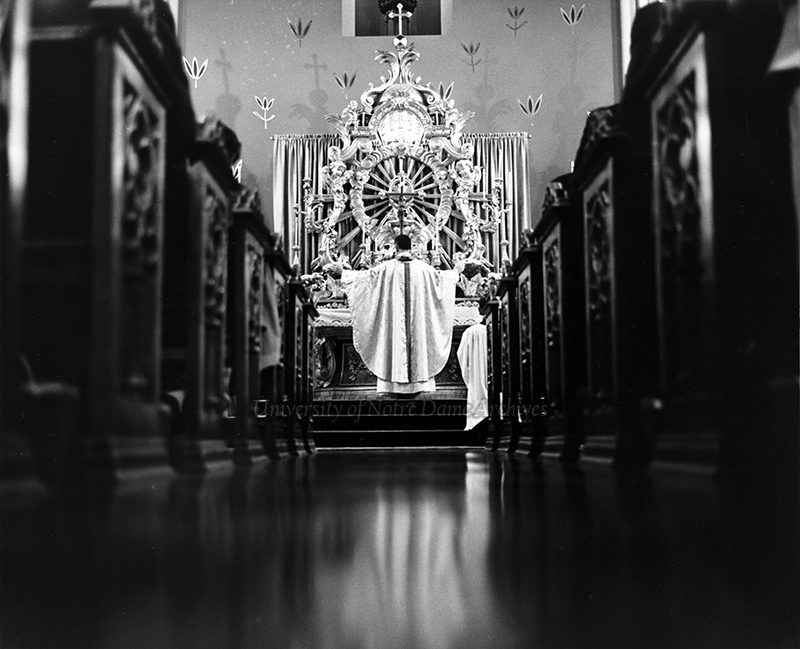 Caption
Caption
Source: University of Notre Dame Archives.
The Mass
The Mass in the Roman Catholic Church is a recapitulation of the Last Supper and Christ's sacrifice on the cross, redeeming the sins of all those who believe in Him. It is the central part of salvation, and of all the services performed by a priest, to my mind there is nothing more important than offering Mass. That was why when I was ordained in 1943 I made a personal pledge, to myself more than anyone else, that I would celebrate a Mass every day of my life, although the church did not require that of me or of any other priest. I thought it would serve as a daily act of gratitude for my being accepted as a priest, and also that it would bring me closer each day to the Holy Spirit.
-Father Hesburgh, God, Country, Notre Dame
A Unique Role
When Father Hesburgh was first ordained a priest and working in Washington, D.C., he was made an auxiliary chaplain by then Bishop John O'Hara (former president of Notre Dame, 1934-1940, and later Cardinal O'Hara). Normally, in order to say Mass (before the Second Vatican Council), a priest was required to fast beginning at midnight and offer Mass in a church before noon. Being a military chaplain meant he had greater flexibility in offering Mass than was typical of the day. "I could offer Mass several times a day if necessary. ... I could drink liquids in between Masses, set up portable altars in appropriate places if I had to, and say Mass in hotel rooms, on trains, and in other unconventional places." Later, when Father Hesburgh was back at Notre Dame and traveling often, Bishop O'Hara agreed to give him the same faculties as needed while traveling.
In his autobiography, Father Hesburgh shares stories about saying Mass in a dining car on a Southern Pacific Railroad train, an American Airlines office at the Dallas airport, and on an icebreaker in Antarctica. In a pamphlet he wrote for U.S. servicewomen during World War II, Father Hesburgh said, "If you appreciate what the Mass is, you'll be at Mass whenever it's humanly possible."
At Notre Dame
As hall rector of Badin and then Farley, Father Hesburgh would regularly say Mass in the dorm chapel. When he moved into administration, he would often celebrate Mass in the Sacred Heart crypt chapel. As president, it was important for him to be available to the students, so he made a point of offering Mass in each residence hall once per year. And in retirement, he had a simple, private chapel next to his office in the library in which he would often say Mass. He was known to have stepped outside of his office to locate an unsuspecting student or researcher in the library to read for the liturgy.

Source: University of Notre Dame Archives.
Around the Globe
Father Hesburgh offered Mass all over the world, with people of all faiths. He mentioned in his autobiography, "I believe very deeply in ecumenism, in Christian unity, and I have been very fortunate to have had numerous opportunities to involve people of many faiths in the Masses I have offered."
In 1957, Father Hesburgh was in Vienna, Austria, as a Vatican representative for the International Atomic Energy Agency. He and his fellow delegate, Frank Folsom, decided to organize a Mass in order to help ease tensions within the agency. Though the archbishop, Franz Koenig, celebrated Mass, Father Hesburgh planned everything, including bringing in the renowned Vienna Boys Choir, cleaning of the church, writing the homily, and convincing the archbishop to read the Gospel in five languages. Father Hesburgh recalled that there was a great mix of faiths among the delegates: Moslems, Hindus, Buddhists, and non-believers. He noted, "We made it an annual tradition, and it was truly marvelous the way it affected the delegates. After our Mass and convivial brunch, everybody would show up Monday morning ready to go to work again, full of optimism and good spirits."
For fourteen years, Father Hesburgh spent Christmas in Mexico with two friends, C.R. Smith, the president of American Airlines, and Charles Jones, president of the Richfield Oil Corporation. During their first trip to Mexico, Father Hesburgh said the midnight Christmas Eve Mass and New Year's Eve Mass for a small village, and he invited his two friends to attend Mass which would became a fourteen-year tradition for the group of friends.
While at a meeting of the Tantur Ecumenical Institute International Advisory Board for the Notre Dame Ecumenical Council in Wells, England, in 1989, Father Hesburgh was invited to say Mass in an Anglican church. He celebrated Mass with Catholics and Anglicans in a liturgy that combined the two traditions.
In 1988, while at a conference on human rights in Moscow, Father Hesburgh was invited by the Russian Orthodox archbishop to say Mass at his chapel. Father Hesburgh used his homily as a means of unifying the diverse group.
Grace and Peace
Throughout his life, Father Hesburgh believed and lived out what he had articulated early on in his vocation: "Offer up your little sacrifices with the Great Sacrifice of Christ when you go to Mass, and then your sacrifice, like His, will bring great graces to yourself and many others. We can play down this spirit of sacrifice in the Christian life today. However, the world won't be saved any other way."
To Father Hesburgh, the Mass was the ultimate means of peace and unification, the greatest prayer, and greatest act of love.
"[I]f you stay close to Our Lord through prayer and the sacraments, I am absolutely sure that all will be well with you. If God is with you, who can be against you?"

Source: University of Notre Dame Archives.